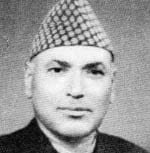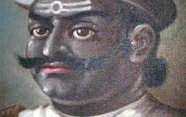Nepali Congress has a number of political leaders who made immense contributions to institutionalize the party. But many leaders were buried in the ashes without their due recognition. Former general secretary Surya Prasad Upadhayaya was one of them.
“Suryababu was a controversial figure in Nepali Congress. In whatever words he is described on the basis of hearsay, he was a patriot and democrat till his death,” writes Madan Mani Dixit, describing Upadhyaya’s contribution in his article.
Known for his fine personality, Upadhyaya stood side by side with NC leader B. P. Koirala in most of early days of Nepali Congress. Although he lost the elections from two constituencies in the first parliamentary elections in 1960, Upadhyaya, who was later appointed as Home Minister, was the key figure to make NC’s victory possible. Having been a politician with friendly contacts with Indian political leaders, including former prime minister Jawaharlal Nehru, Upadhyaya was an asset for Nepali Congress and Nepal.
“Yes. It is true that Surya Prasad was close to India. However, he never harmed Nepal’s interests even as being close to India,” writes Madan Regmi. Suryababu is a political as well as intellectual personality.
“Suryababu was personally a good friend of B.P. Koirala. Because of this intimacy, they stood together during the very difficult political period after the revolution of 1950s. His contribution in Nepal’s democratic movement is unforgettable,” writes Bishowbandhu Thapa.
Had there been a good understanding between B.P. Koirala and Surya Prasad Upadhyaya, Nepal’s democratic process would not have suffered for such a long time. However, the political relations between B.P. and Upadhyaya, who reportedly played a crucial role to release B.P. Koirala from prison in 1965, failed to restore.
Although B.P. Koirala went to exile in India for decades, Upadhyaya preferred to stay in Nepal. During the whole period of panchayat until his death, Upadhyaya remained an inspiration for Nepali Congress workers in Nepal. He always opened his house to the service of Nepali Congress.
About a couple of books related to the political views of B.P. Koirala have already been published but Upadhyaya, who was also highly intellectual, left nothing to show his views. Although Upadhyaya also has many disciples in Nepal, they too have hardly bothered to bring the literature about him into the public light.
With a big collection of books in his home, Surya Prasad Upadhyaya, an Indian freedom fighter, might have written certain memoirs and views. Nothing has come out even more than two decades after his death.
Finally, twenty-three years after his death, a human right activist Mahamunishwor Acharya published a book dedicated to Surya Prasad Upadhyay and his contributions in the Nepalese democratic movement.
Edited by Acharya, the book Surya Prasad Upadhyaya: Multi Dynamic Personality in Democratic Movement (Prajatantrik Andolan Ka Bahuayamik Byaktitwo: Sura Prasad Upadhyaya) is a collection of 81 articles, some documents and photographs.

This is the first book which evaluates the overall personality of Surya Prasad Upadhyaya in different dimensions touching his contemporary politicians like Bishowbandhu Thapa to his political disciples former prime minister Kirtinidhi Bista, and Surya Bahadur Thapa.
Along with B.P. Koirala, Subarna Sumsher Rana, Ganesh Man Singh and Krishna Prasad Bhattarai, Surya Prasad Upadhyaya, a leader with high intellectual caliber, also played a prominent role to preserve the identity and ideology of Nepali Congress party till his death in 1986.
Unlike the present set of Nepali Congress leaders, Upadhyaya was a leader among the big four of Nepali Congress. The big four, B.P. Koirala, Ganesh Man Singh, Subarna Sumsher and Surya Prasad Upadhyaya, led Nepali Congress till 1961.
It is common that many mentioned about Surya Prasad Upadhyaya’s intellect and elegancy in speeches. In the absence of any written documents and views, the personality of Upadhayaya remained overshadowed. In contemporary politics, B.P. Koirala, who himself made a lot of contribution in literature, ideologically and intellectually shined because of publication of four books by senior advocate Ganesh Raj Sharma.
“He was highly intellectual, simple, diligent, and helpful and gave high value to conversation. The foundation of B.P. Koirala’s national reconciliation is the statement taken by Surya Prasad Upadhyaya in 1965,” writes former speaker Daman Nath Dhungana.
“He never stood against party’s policy and adhered to party’s stand. He had never opposed democracy. Despite all his commitments, Nepali Congress was unjust against him,” writes political scientist Lok Raj Baral.
Known for his well established library at his residence, Upadhyaya luckily escaped from arrest in 1934 along with four martyrs when the police found Grammar of Politics of Laski.
Late Daman Raj Tuladhar in his memoir also has mentioned Upadhaya’s high intellectual caliber.
With the various articles in the book, Acharya highlighted the important contributions of Uapadhyaya. Still more needs to be done to give justice to Upadhyaya’s role in Nepali contemporary politics.

Keshab Poudel
Poudel is the editor of New Spotlight Magazine.
- CLA: Samriddhi For Skill Development
- Apr 23, 2024
- ECONOMY: Growth At 3.3
- Apr 16, 2024
- DPM’s SHRESTHA’S CHINA VISIT High Profile, Low Key
- Apr 14, 2024
- Maha Kumbha In Barahkshetra: A Sacred Festival In Sacred Koshi (Kaushiki) River
- Apr 09, 2024
- LOSS AND DAMAGE: Upper Tamakoshi A Case
- Apr 02, 2024
















